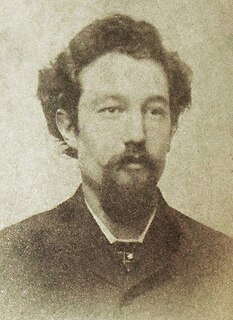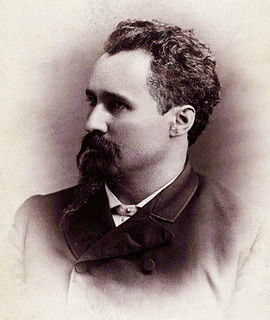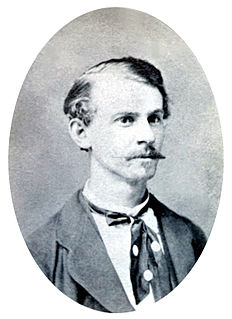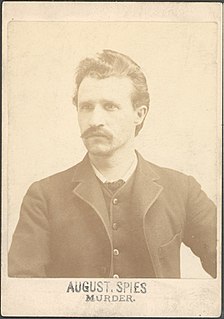 W
WThe Haymarket affair was the aftermath of a bombing that took place at a labor demonstration on May 4, 1886, at Haymarket Square in Chicago. It began as a peaceful rally in support of workers striking for an eight-hour work day, the day after police killed one and injured several workers. An unknown person threw a dynamite bomb at the police as they acted to disperse the meeting, and the bomb blast and ensuing gunfire resulted in the deaths of seven police officers and at least four civilians; dozens of others were wounded.
 W
WGeorge Engel was a labor union activist executed after the Haymarket riot, along with Albert Parsons, August Spies, and Adolph Fischer.
 W
WSamuel "Sam" Fielden was an English-born American Methodist pastor, socialist, anarchist and labor activist who was one of eight convicted in the 1886 Haymarket bombing.
 W
WAdolph Fischer was an anarchist and labor union activist tried and executed after the Haymarket Riot.
 W
WJoseph Easton Gary was judge who presided over the trial of eight anarchists tried for their alleged role in the Haymarket Riot. Born in Potsdam, New York, USA, he worked as a carpenter, then moved to St. Louis in 1843 to study law. He was admitted to the bar in 1844 and practiced for five years in Springfield, Missouri. In 1849 he moved to Las Vegas, which was then part of the State of Deseret, and established a practice there. He then moved after three years to San Francisco, then to Berlin, Wisconsin, before moving to Chicago in 1856.
 W
WThe Haymarket Martyrs' Monument is a funeral monument sculpture located at Forest Home Cemetery in Forest Park, Illinois, a suburb of Chicago. Dedicated in 1893, it commemorates the defendants involved in the labor unrest and bombing related to the Haymarket Affair (1886). On February 18, 1997, it was designated a National Historic Landmark.
 W
WThe Haymarket Tragedy is a 1984 history book by Paul Avrich about the Haymarket affair and the resulting trial.
 W
WLouis Lingg was a German-born American anarchist who committed suicide while in jail after being convicted and sentenced to hang as a member of a criminal conspiracy behind the Haymarket Square bombing. Lingg committed suicide in his cell with an explosive shortly before his scheduled execution.
 W
WOscar William Neebe I was an anarchist, labor activist and one of the defendants in the Haymarket bombing trial, and one of the eight activist remembered on May 1, International Workers' Day.
 W
WAlbert Richard Parsons (1848–1887) was a pioneering American socialist and later anarchist newspaper editor, orator, and labor activist. As a teenager, he served in the military force of the Confederate States of America in Texas, during the American Civil War. After the war, he settled in Texas, and became an activist for the rights of former slaves, and later a Republican official during Reconstruction. With his wife Lucy Parsons, he then moved to Chicago in 1873 and worked in newspapers. There he became interested in the rights of workers. In 1884, he began editing The Alarm newspaper. Parsons was one of four Chicago radical leaders controversially convicted of conspiracy and hanged following a bomb attack on police remembered as the Haymarket affair.
 W
WMichael Schwab was a German-American labor organizer and one of the defendants in the Haymarket Square incident.
 W
WAugust Vincent Theodore Spies was an American upholsterer, radical labor activist, and newspaper editor. Spies is remembered as one of the anarchists in Chicago who were found guilty of conspiracy to commit murder following a bomb attack on police in an event remembered as the Haymarket affair. Spies was one of four who were executed in the aftermath of this event.